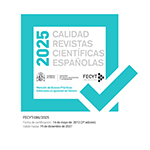'Si no fuere tu hija ilustre': Women Writers’ Social Status in Early Modern Spain
Abstract
The numbers of women writers of the early modern Spain currently identified have risen to over five hundred, with their writings catalogued and systematized by the Spanish data base Biblioteca de Escritoras Españolas (BIESES). The data base’s findings demonstrate the kinds of genres women writers selected, and includes archival documents, correspondence, and other kinds of documentation that reveal much more biographical information than previously obtained. What has yet to be studied more in depth, however, is the social status of the writers, as social origins were a crucial means of identifying one’s self, both from a psychological perspective as well as within society. This article examines the social stratification of writers to weigh their contributions, and arrives at the conclusion that while non-noble women tended to dedicate their time to writing literary works, whether poems, theater, or prose fiction; the few women of the titled nobility who wrote instead authored non-literary works such as correspondence and treatises that allowed them to participate significantly in political crises of the time.
Downloads
Article download
License
In order to support the global exchange of knowledge, the journal Cuadernos de Historia Moderna is allowing unrestricted access to its content as from its publication in this electronic edition, and as such it is an open-access journal. The originals published in this journal are the property of the Complutense University of Madrid and any reproduction thereof in full or in part must cite the source. All content is distributed under a Creative Commons Attribution 4.0 use and distribution licence (CC BY 4.0). This circumstance must be expressly stated in these terms where necessary. You can view the summary and the complete legal text of the licence.












